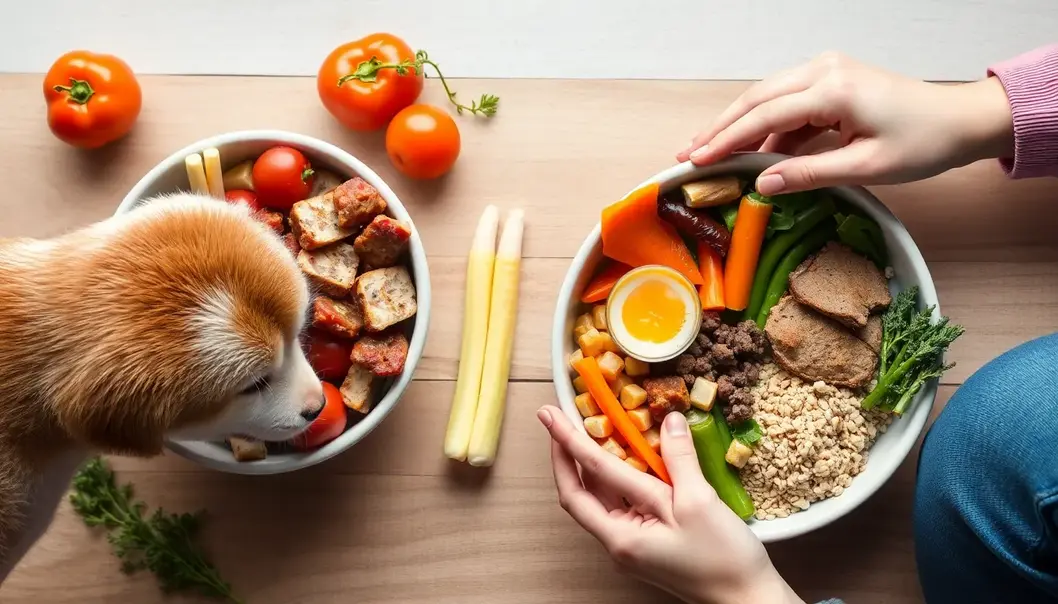Caring for a pet provides warmth and companionship that enriches our lives in countless ways. But did you know that what you feed your pet—and yourself—can significantly influence your mental health? Nutrition plays a fundamental role in how we feel, and understanding this connection can help both humans and animals thrive. Just as you care about offering the best to your beloved furry friend, prioritizing nutrition benefits both of you, fostering a harmonious and joyful life together. Let’s delve into how a balanced diet supports mental well-being, offering insights that nurture both body and soul.
The Power of Nutrition on Mental Wellness

Nutrition plays a crucial role in our mental health, influencing everything from mood swings to emotional resilience. A balanced diet, rich in essential nutrients, can greatly enhance mental well-being for both humans and their pets. For humans, diets lacking in key nutrients can lead to increased stress, anxiety, and even depression. Pets, similarly, are affected by their diet’s nutritional quality, impacting their behavior and mood.
Omega-3 fatty acids, found in fish and flaxseed, are known to support brain function and reduce depression in people. These fatty acids also benefit pets, promoting a glossy coat and reducing inflammation, which can lead to more playful and energetic behavior. Another crucial nutrient, vitamin D, is essential for mood regulation in humans and supports the immune system and cognitive function in animals. Lack of vitamin D can lead to low mood and lethargy, highlighting the importance of outdoor activities that provide both exercise and sunlight, a natural source of this vitamin.
Antioxidants, found in fruits and vegetables, protect the brain from oxidative stress. Blueberries, rich in antioxidants, improve memory and cognitive functions for humans. For dogs, blueberries are a safe, low-calorie treat that supports brain health. Research indicates that feeding dogs a diet high in antioxidants can improve learning ability and high brain function.
Ensuring adequate protein intake is also essential for mental wellness. Protein contains amino acids which are the building blocks for neurotransmitters responsible for mood regulation. A lack of essential amino acids can lead to mood disturbances in humans and behavioral issues in pets.
For our feline companions, taurine, an essential amino acid found in meat and fish, is critical for health. Taurine deficiency in cats can result in serious health issues, underscoring the need for balanced nutrition tailored to their specific needs. Ensuring your cat has a diet high in taurine can promote both physical and mental health, making them more vibrant and interactive.
The gut-brain connection plays a significant role in the relationship between diet and mental health. Probiotics are beneficial for gut health, enhancing mood and reducing anxiety in humans. Fermented foods like yogurt and natural supplements can maintain balance. For pets, probiotics aid digestion and improve mood and anxiety levels, allowing them to feel more content and energetic. More information on how diet impacts cat behavior and training can be found in our insights about successful cat training.
Ultimately, a balanced diet is essential for the overall mental wellness of our animal companions and ourselves. It promotes a positive mood, improved behavior, and emotional stability. As we delve deeper into crafting a balanced diet in the next chapter, we will explore practical strategies for ensuring nutrition that supports mental health for you and your pet.
Crafting a Balanced Diet for You and Your Pet

Creating balanced diets for both you and your furry friend can be an enriching journey that strengthens your bond while boosting mental health. Our food choices can profoundly affect mood and emotional well-being, a principle that applies to both humans and pets. The key lies in weaving together fresh ingredients that nourish the body and soul.
To get started, consider the nutritional needs that are unique to both species. Humans thrive on a varied diet rich in fruits, vegetables, whole grains, lean proteins, and healthy fats—these provide essential nutrients that support brain function and mood regulation. Similarly, pets require a balanced blend of proteins, carbohydrates, fats, vitamins, and minerals. For cats, this often means a focus on proteins as they are obligate carnivores with specific amino acid requirements.
One practical tip for crafting a shared dietary plan is embracing fresh ingredients. Fresh foods are not only tastier but often more nutritionally complete. For you, this might mean incorporating more salads, roasted vegetables, or whole fruits, which can provide antioxidants that combat oxidative stress linked to mood disorders. For your pet, consider adding fresh lean meats or cooked vegetables to their meals, enhancing both flavor and nutrition.
Another strategy is mindful meal preparation. Batch cooking a selection of meals at the start of each week can save time and ensure you always have healthful options ready. Consider preparing elements of meals that can be shared with pets, like plain, boiled chicken or turkey, sweet potatoes, or carrots. Just ensure any foods shared with pets are free from harmful ingredients like garlic or onions.
Portion control is also crucial. Overfeeding can lead to obesity, which is a well-known factor in numerous health problems, including those affecting mental health. Use measured portions to keep both you and your pet at healthy weights. Investing in a kitchen scale to weigh food helps provide precise portions, particularly for pets.
Finally, stay attentive to dietary responses. Notice how different foods impact your or your pet’s energy levels, mood, and overall health. This dynamic approach means making adjustments when necessary to maintain an optimal diet tailored to your shared lifestyle.
For more insights on providing a happy and healthy life for your feline friend, check out our article on Feline Fundamentals: Unlocking the Secrets to Successful Cat Training. Understanding your pet’s unique needs is an essential part of crafting a balanced regiment.
In conclusion, thoughtful diets can create a vibrant path to enhanced well-being for both you and your pet. The practice of choosing whole, fresh ingredients not only physically nourishes but can also lead to improved mental health outcomes, reinforcing the profound connection food has with how we feel each day.
Final words
Prioritizing nutrition holds the key to enriching your life and the life of your pet. A balanced diet not only fortifies the body but also cultivates a positive mental state, paving the way for a healthier, happier life. By nurturing both yourself and your pet with wholesome nutrition, you create a supportive environment where you both can flourish together, enjoying the shared journey of well-being.
Enhance the bond with your pet by exploring tailor-made nutrition plans. Visit our website for expert guidance.
Learn more: https://www.happypethealth.com
About us
Happy Pet Health specializes in creating personalized nutrition plans that cater to both pets and their owners. Our experts guide you in selecting the best ingredients that support mental and physical well-being, ensuring a joyful life for you and your furry companion.

